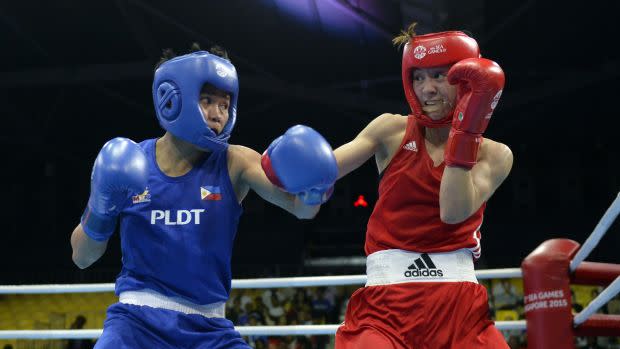The Philippines’ first female Olympic boxer makes her debut in Tokyo
- Oops!Something went wrong.Please try again later.

What must it do to the heart to come so close only to fall short 25 consecutive times? This has been the Olympic saga of the Philippines, a sports-obsessed nation that has never won a gold medal. And no, the gold medal from a demonstration bowling tournament at the 1988 Summer Games does not count.
Boxing has yielded the most Olympic silver and bronze medals for the country. The Philippines has a legacy of great pugilists who somehow never made it to the top podium. Apart from Manny Pacquiao, who retired before the Rio Olympics, two Filipinos—Pancho Villa and Flash Elorde—have been inducted to the International Boxing Hall of Fame, and five are currently world champions.
Of the 19 Filipino athletes who have qualified for the Tokyo Games, the country is again pinning its hopes for Olympic gold on its boxing contingent, who trained with their Thai counterparts at a Covid bubble in Samui Island, about a 90-minute flight south of Bangkok. Among them is Irish Magno, a 29-year old flyweight who has already made history for being the first Filipina boxer to qualify for the Olympics, and makes her Olympic debut on July 25.
Female boxers at the Olympics
Though female pugilists have been competing in tournaments since the 19th century, women’s boxing was only formally recognized as an Olympic sport at the 2012 London Games. At that time, there was some debate whether female boxers should wear skirts in competition “to give a womanly impression,” as Ching-Kuo Wu, former president of the International Boxing Association argued. That idea was swiftly shelved.
Magno, who has become somewhat of an LGBT icon in the Philippines, recalls that she loved the sense of parity in the boxing community. Sparring and winning against her male counterparts in her weight class bolstered her confidence. “I liked being in the team because we are really treated as equals,” she explains. “Coaches would not underestimate us because of our gender. Whatever men can do, women can too.”
“It’s a fantastic feeling when you land a solid punch and hear the cheering and good-natured jeering from the coaches,” Magno says. “We pick up techniques from our male teammates too. Filipino boxers are known to be swift, agile, and wily. When Filipinos enter the ring, you can really sense the fighting spirit, as they say.”
Fighting for her family
Like many Filipino athletes, joining the national team is as much about passion as it is about making a living. Athletes receive the equivalent of $30 a day from the Philippine Sports Commission, with bonuses if they win a medal. By law, those who compete under the Philippine pennant are entitled to free healthcare, affordable housing, scholarships, and various discounts in commercial establishments. An Olympic gold could earn an athlete $200,000, as well as millions more from potential endorsement deals.
This would change Magno’s family’s lives. Born in Iloilo, at the center of the Philippine archipelago, her youth was spent working shoulder-to-shoulder with her parents at a farm to make ends meet.
“Our life in the province was hard so I thought I could help my family this way,” she tells Quartz. “I didn’t tell my parents that I was going into boxing at first. I would go straight from school to the town plaza to train on the sly. Inevitably they wondered why I was getting home so late. One day my mother followed me after school. That’s how they found out and I was so deep into training that there wasn’t a lot they could do at that point.”
Even with the promise of a scholarship and a steady stipend, Magno’s parents opposed her career path. “My father believed that boxing is a man’s sport, totally unsuitable for a proper woman. He said that he’s never hit any of us that way and it was hard for him to see others—including male boxers—pummel his daughter.”
With both of her parents losing their jobs during the pandemic, her monthly government stipend has kept her family afloat. But it hasn’t been stable. In an emotional Facebook post that she has since deleted, she lamented how not getting the monthly allowance from the Philippine Sports Commission has impacted her family. “I was really at a loss,” Magno explains. “I’m really the main breadwinner. I have three young siblings and it’s really hard to hear them describe how dire the situation was. I thought, here I am in the training bubble with all the delicious food I could ever want. If only I could give them part of my meal, I would.”
Magno also confessed how her family’s financial struggles kept her from being able to focus on training for Tokyo. Donations from her supporters quickly poured in.
Ready for Tokyo
Speaking to Quartz just weeks before she enters the ring at the Ryōgoku Kokugikan arena, Magno said she’s increasingly excited about the Olympics, despite the risk. “This is when all the training comes together,” she explains. “I do admit though that there’s some fear and apprehension because of Covid.”
The goal is nothing short of gold, Magno says. “I really hope we get it this time. We’re praying hard; we’re training hard.'”
This interview was conducted in Filipino. It has been translated and edited for clarity.
Sign up for the Quartz Daily Brief, our free daily newsletter with the world’s most important and interesting news.
More stories from Quartz:
These are the countries where the delta variant of Covid-19 is now dominant
Why the US can’t just beam internet into authoritarian states like Cuba
